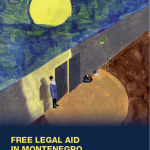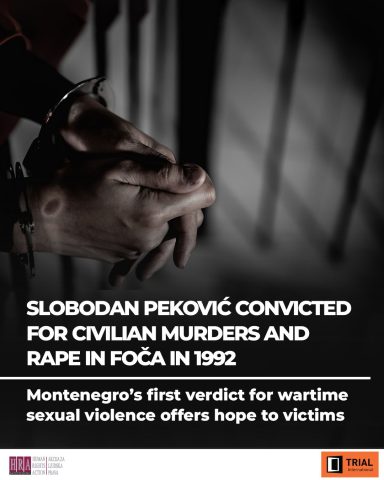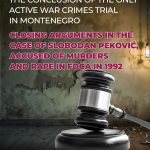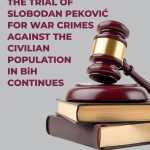
CIN-CG/HRA: MONTENEGRO IMPROVED THE LAW ON FREE LEGAL AID LAST YEAR, BUT STILL DOES NOT IMPLEMENT IT PROPERLY – Relatives of those who went missing during the war should also be allowed to use free legal aid
19/07/2025
Free Legal Aid in Montenegro – Progress, Challenges and Recommendations
22/07/2025SLOBODAN PEKOVIĆ CONVICTED FOR CIVILIAN MURDERS AND RAPE IN FOČA IN 1992 – MONTENEGRO’S FIRST VERDICT FOR WARTIME SEXUAL VIOLENCE OFFERS HOPE TO VICTIMS

The Higher Court in Podgorica today, after a three-year trial, sentenced Slobodan Peković to 20 years in prison for a war crime against the civilian population committed in 1992 in Bosnia and Herzegovina.
Peković was convicted of killing two civilians, Emina and Mujo Šabanović, in the village of Hum near Foča, as well as for the rape of a protected female victim in an apartment in Foča, whom he took from the notorious “Partizan” sports hall.
The trial chamber was presided over by Judge Nada Rabrenović, with judges Zoran Radović and Goran Šćepanović as members. The indictment was led by special prosecutor Tanja Čolan Deretić.
The verdict marks an important step forward for the Montenegrin judiciary, as it is the first conviction for wartime sexual violence and the harshest sentence for war crimes since the conviction for the killing of the Klapuh family members in 1996. This ruling is a significant development in the prosecution of war crimes in Montenegro and may serve as encouragement for other victims to seek justice through legal proceedings.
The verdict is a first-instance ruling, and the defendant has the right to appeal before the Court of Appeals of Montenegro.
Slobodan Peković, who previously bore the surname Ćurčić, was found guilty of participating as a member of the Army of the Republika Srpska in an attack on the village of Hum near Foča in June 1992. At that time, together with other soldiers, he dragged Emina Šabanović out of her house, beating her all over her body with a shovel and pulling her by the hair. He then took her to the house of Mujo Šabanović, where he shot and killed both of them with automatic weapons, and subsequently set the house on fire with their bodies inside.
Peković was also convicted of the rape of protected witness A1. Namely, after A1 was forcibly brought to Foča, to the “Partizan” sports hall, Peković took her out of the hall together with her underage child, witness A2, and several other women and children. He led them to an apartment across from the police station, where A1 was raped.
In explaining the verdict, the court stated that it had been proven during the trial, based on witness testimonies, that Peković was present in the village of Hum on June 8, 1992, together with other members of the Army of the Republika Srpska. The court particularly valued the testimony of witness Ramiza Grcić, who saw Serbian soldiers dragging Emina Šabanović out of her house, hitting her with a shovel, throwing her over thorn bushes, pulling her by the hair, and taking her unconscious to Mujo Šabanović’s house. Shortly afterward, the house was set on fire, and the charred bodies of Emina and Mujo were found. Ramiza stated that she recognized Peković because he removed the sock from his head at one point, and she had known him from before.
Regarding the second part of the indictment, the Court noted that the testimony of victim A1 was detailed—both in relation to Peković’s conduct toward her and toward the other women in the apartment, who were also raped by other soldiers. Although A1 did not personally know Peković, he was identified by witness A2, who had known him previously. It was established that A1, A2, and other women were taken from the “Partizan” sports hall and brought to an apartment near the police station, where Peković raped A1. The rape allegations were also corroborated by medical documentation.
These facts were also established by the Court of Bosnia and Herzegovina in its conviction of the accused Jasko Gazdić, a verdict referenced by Special Prosecutor Čolan Deretić during her closing arguments. In the proceedings held in Sarajevo, the witness clearly accused both Gazdić and Ćurčić (Peković) of rape, and the Court of BiH accepted her testimony as credible, detailed, and corroborated by medical documentation. The Court further noted the objectivity and impartiality of victim A1’s testimony, highlighting that she made a clear distinction in the behavior of the accused — stating that Slobodan Ćurčić (Peković) was rough, loud, and arrogant, while Gazdić remained silent and smiled throughout.
As aggravating circumstances, the court considered Peković’s prior convictions, his persistence and brutality in committing the crimes, as well as his cunning and deceitfulness — especially in light of the fact that he frequently stayed in the village of Hum, was well known to the locals, yet showed them no mercy. The court did not accept as a mitigating factor the fact that Peković is the father of two children, stating that he showed no compassion during the commission of the crimes, and noting that during the rape of A1, her five-year-old daughter entered the room, witnessed what was happening, and began to cry.
The court referred victim A1 to civil litigation in order to pursue her property claim. This now exposes the victim to further victimization, as she must initiate a new legal proceeding, disclose her identity, and relive the trauma in order to obtain compensation from Peković — which constitutes a violation of standards for the protection of victims of sexual violence. We believe that the court should have ruled on the victim’s compensation claim within the criminal proceedings, as there was sufficient time to order an expert evaluation of her psychological and physical condition, given two prolonged periods of inactivity during the trial totaling 19 months without a single hearing.
Dalibor Tomović, the victim’s attorney, stated: “I believe this is a major step forward, considering that this is the first case of wartime sexual violence in Montenegro. Given that the first-instance trial lasted three years, and that 33 years have passed since the crime was committed, I hope that, in the event of an appeal by the defense, the Court of Appeals will treat the case as a priority.”
Ajna Mahmić, Legal Coordinator at TRIAL International Office in Bosnia and Herzegovina, Sarajevo:
“I believe this verdict is the result of the joint, long-standing, and dedicated work of survivors and organizations fighting for justice for victims of war crimes. I would like to express special gratitude to our client, the protected witness – a brave woman who, despite years of silence, trauma, and fear, chose to speak out and seek justice. Her determination, dignity, and strength initiated this process and made it possible for the crime to be named, acknowledged, and sanctioned. I also thank her family for the support they provided throughout the entire process – without them, this moment would not have been possible.”
Tea Gorjanc Prelević, Executive Director of Human Rights Action, Podgorica:
“With this verdict, the Montenegrin judiciary has shown that it is capable of handling complex trials involving sexual violence, in which the victims are protected witnesses. I expect the state to ensure that decisions on the property claims of such victims are made within the criminal proceedings, and that victims are spared additional trauma. This verdict is important because it forces us to confront the facts about the involvement of Montenegrin citizens in mass war crimes, particularly the rapes of women in Bosnia and Herzegovina. I urge anyone with knowledge about such crimes to contact the state prosecutor’s office. All such crimes have left lasting and painful marks on the lives of innocent people and their families, especially children.”
Lawyer Dalibor Tomović is representing the injured party, A1, as part of the NGO Human Rights Action’s project “Together for Justice – Legal, Psychological and Social Support for Victims of War Crimes,” which is supported by the European Union through the regional project “EU Support to Confidence Building in the Western Balkans,” implemented by the United Nations Development Programme (UNDP).







 English
English